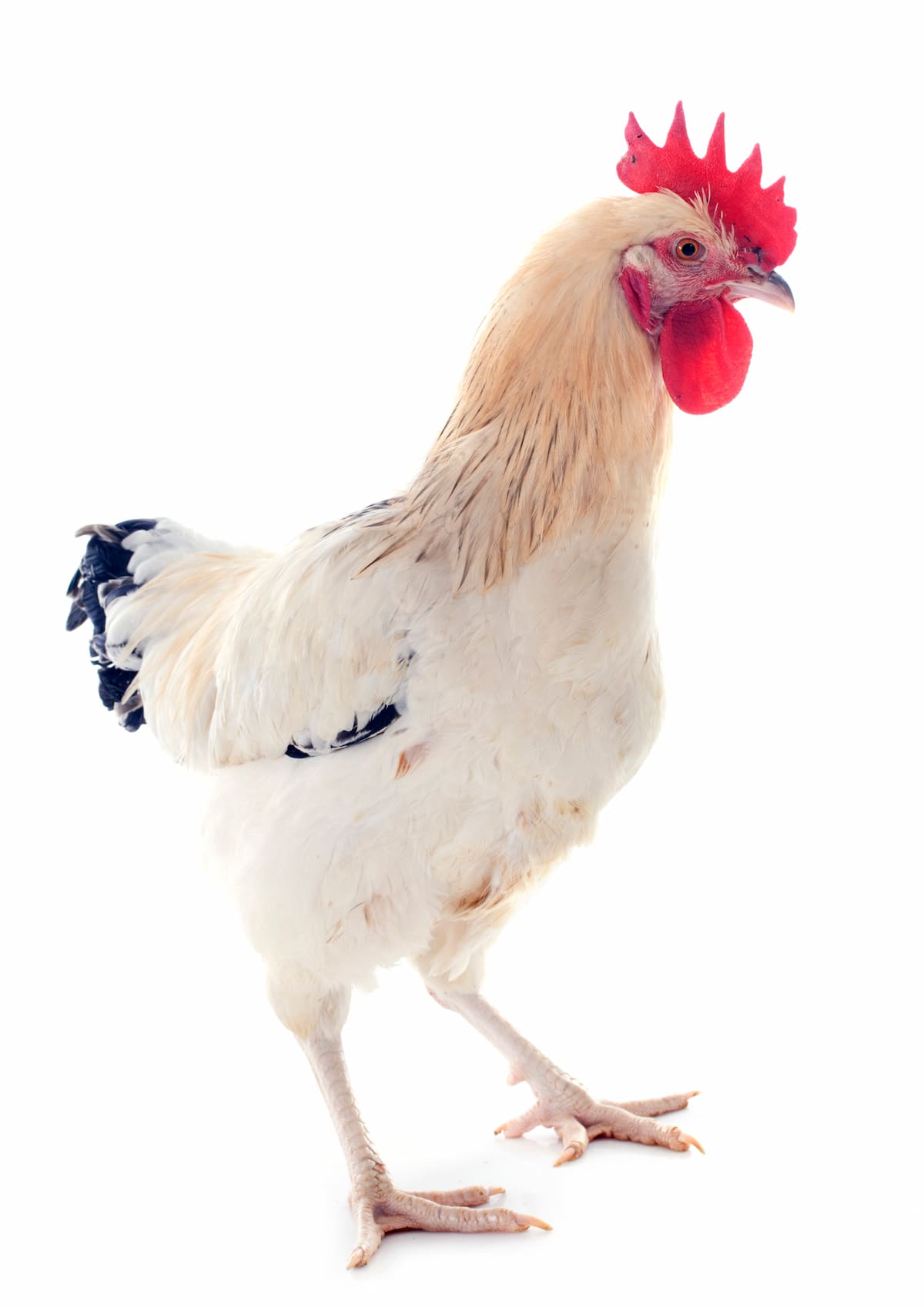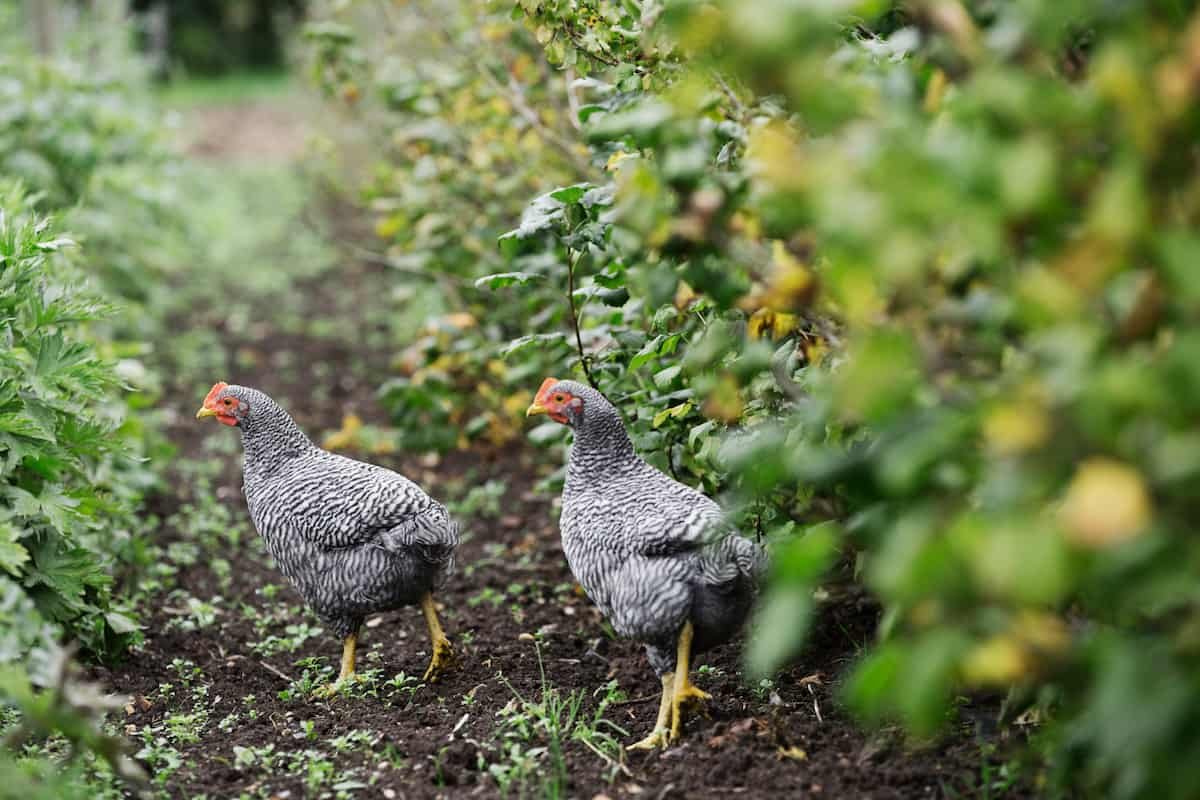The Sussex is a British breed of dual-purpose chicken breed, reared for its meat and eggs. The Sussex is a large, well-rounded chicken that is a good forager and does well in free-range and confined environments.

Guide to Sussex Chicken Breed
What is the Sussex Chicken Breed?
The Sussex chicken breed is a dual-purpose chicken developed in England in the 19th century. The Sussex is an active bird that works well in free-range and confined environments. They are good foragers and do well on a diet of grains, vegetables, and insects. Sussex chickens are known for their docile nature and make good pets and egg layers.
Characteristics of Sussex Chicken Breed
- Weight – Hens (7lb) Roosters (9lb)
- Egg production – 4-5 per week
- Egg color – Brown
Sussex Chicken Personality and Temperament
The Sussex chicken is a beautiful, docile bird perfect for first-time owners. They are friendly, making them excellent backyard pets. When it comes to personality, Sussex chickens are gentle giants. They are not aggressive or territorial and get along well with other chickens and animals. They are curious birds that love to explore their surroundings. Sussex chickens are relatively calm compared to other chicken breeds, making them great for families with small children.
When it comes to caring, Sussex chickens are easy to look after. They are a hardy breed that is resistant to disease and pests. They do well in both hot and cold climates, making them ideal for backyard chicken keepers in all parts of the world. Sussex chickens need a well-ventilated coop with plenty of space to roam. They also require a diet of high-quality chicken feed and fresh water daily.
Egg Production of Sussex Chicken Breed
The Sussex chicken breed is known for its egg production. On average, a Sussex chicken will lay 4-5 eggs per week. This high egg production rate is one of the reasons why the Sussex chicken breed is so popular among backyard chicken keepers. To get the most out of your Sussex chickens regarding egg production, providing them with a good diet and housing is important.
A healthy diet for a Sussex chicken should include plenty of protein and calcium. Good protein sources for chickens include insects, worms, and other small animals. You can supplement your chickens’ diet with commercial chicken feed, which usually contains a higher protein level than in nature.
Sussex Chicken Breed Health Care
- When it comes to health care, Sussex chickens are pretty low-maintenance. They are a hardy breed that is resistant to many common chicken diseases. However, like all chickens, they are susceptible to certain health problems.
- Sussex chickens are relatively easy to keep when caring for and feeding. They do well on a diet of commercial chicken feed supplemented with greens and other fresh foods. They must always have access to clean water and keep their housing clean and dry.
- Regarding health care, Sussex chickens are generally quite hardy birds. However, like all poultry breeds, they are susceptible to common diseases and parasites. These include Newcastle disease, avian influenza, coccidiosis, and mites/lice. Regular preventive measures such as vaccination and worming will help keep your flock healthy.
In case you missed it: Ultimate Guide to Plymouth Rock Chicken Breed: Characteristics, Care, Feed, and Health Care

Most Common Health Concerns for Sussex Chickens and How to Prevent Them
- Parasites: Chickens can be infected with various parasites, including mites, lice, and worms. These can cause serious health problems for your chickens, so it’s important to do regular checks and treat your flock if necessary.
- Respiratory infections: Sussex chickens are affected by respiratory infections due to their large size and heavy breathing. Bacteria, viruses, or fungi can cause these infections and lead to serious health problems if not treated promptly.
- Eye problems: One of Sussex chickens’ most common eye problems is cataracts. This condition can be caused by genetics or an eye injury. If you notice your chicken has cloudy eyes or trouble seeing, take them to a vet as soon as possible.
- Leg issues: Because of their large size and weight, Sussex chickens are susceptible to leg injuries and joint problems. Monitor your chicken’s legs and feet and consult a vet if you notice any swelling or limping.
Different Sussex Chicken Breed Colors
| Speckled | Light |
| Buff | Red |
| Silver | Brown |
| White | Coronation |
Chicken Coop Design
As with any chicken breed, Sussex needs a well-built coop to protect them from the elements and predators. A good rule is to allow 4 square feet of coop space per bird. The coop should have plenty of ventilation to keep the air fresh and should be cleaned out regularly to prevent the build-up of ammonia fumes. The coop floor can be lined with straw, wood shavings, or other bedding material to help absorb manure and keep the birds clean and comfortable.
A small amount of sand can also be added to the floor to help with traction and dust control. The coop has a few windows for ventilation on hot days. Regarding housing, Sussex chickens do best in a spacious coop with plenty of ventilation. The coop should also be protected from predators such as foxes. A well-protected coop will help keep your chickens safe and healthy and produce more eggs.
Feeding Tips for Sussex Chicken Breed
When it comes to feeding your Sussex chickens, you will want to give them a high-quality diet with plenty of protein and calcium. A good way to provide this is through commercial poultry feed formulated for growth and development. You can supplement their diet with grit, oyster shells, or crushed eggshells to help with calcium absorption. In addition to a good diet, Sussex chickens also need plenty of fresh water available at all times.
How Long Do Sussex Chickens Take to Mature?
Sussex chickens have a relatively short lifespan compared to other chicken breeds and generally only need about 20 weeks or so to be ready to lay eggs. However, they are known for being quite hardy and prolific layers so they can be a good choice for those looking for a reliable egg-laying breed.
In case you missed it: Ultimate Guide to Brahma Chicken Breed: Characteristics, Care, Feed, and Health Care

Conclusion
Sussex chickens are a versatile, all-purpose chicken breed known for being friendly and docile. They are also good layers of large brown eggs. Sussex chickens are relatively hardy and adaptable to different climates. They do well in hot or cold weather and can even tolerate cold, wet weather.
- Feed Your Flock for Less: Top 10 Tips to Save on Chicken Feed
- Ultimate Guide to Ossabaw Island Hog: Breeding, Raising, Diet, and Care
- Hatching Answers: The Top 10 Reasons Your Chickens Aren’t Laying Eggs
- Eggs and Economics: Breaking Down the Cost of Raising Backyard Chickens
- Defend Your Greens: Proven Methods to Keep Iguanas Out of Your Garden
- Ultimate Guide to Cinnamon Queen Chicken: A Comprehensive Guide for Beginners
- Ultimate Guide to California Tan Chicken: Breeding, Raising, Diet, Egg-Production and Care
- Ultimate Guide to Marsh Daisy Chicken: Breeding, Raising, Diet, and Care
- 10 Types of Chicken Farming Businesses You Can Start for Profits